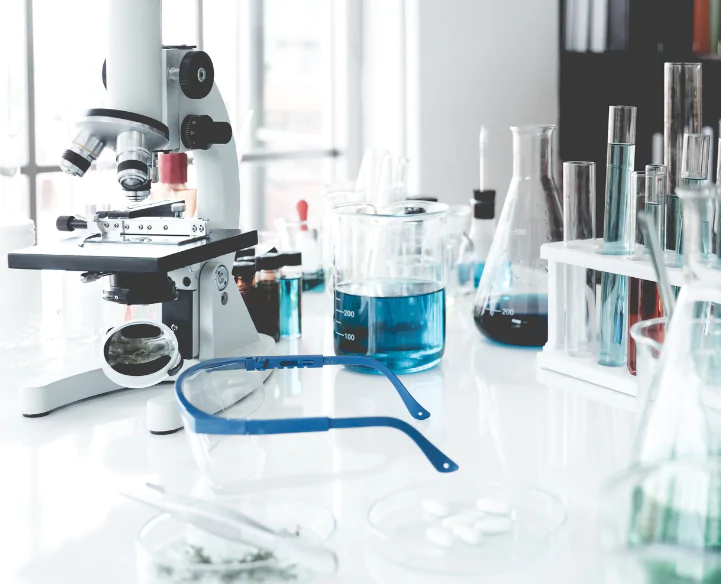Top Chemical Glassware Used in Laboratories and Their Functions
The quality and type of glassware used in laboratories are crucial when it comes to conducting experiments and chemical analysis. Chemical glassware is designed to withstand various chemicals, high temperatures, and pressure while maintaining accuracy in measurements. Whether you are working in a chemistry lab or conducting scientific research, knowing the types of common glassware used in laboratory settings is important.
In this blog, we will discuss some of the most glassware for science: their specific uses and functions, as well as a list of chemical glassware names and explanation of features which make each unique. Whether you are looking for interested in searching for laboratory glassware companies, this guide will have everything you need to know.
Introduction to Chemical Glassware
Chemical glassware is a core tool for doing experiments in chemistry and scientific laboratories. It is known to assist during the time of measurement, for controlling the rates of chemical reaction, and its safety during its handling. Specific types of glasses, like borosilicate, are specially made for usage at very extreme temperatures and undergoing chemical reactions themselves. Scientists or researchers can apply the knowledge for the most important common laboratory glassware to pick suitable tools for a particular experiment.
names of glassware in chemistry lab
There is a general description of the common chemistry glassware used in the laboratory and their purposes as follows;
Beakers
Beakers are the most frequently used type of glassware in any laboratory. They are shallow bottoms that hold liquids, mix components, and heat with stirring. The beakers come in various sizes, and most graduated markings indicate volume measurements. Beakers are not as precise in measurement as some other glasses, but they are highly versatile and used extensively.
Flasks
Flasks come in different shapes; there are Erlenmeyer flasks and round-bottom flasks. These types of glassware instruments are mainly used to mix, heat, or store chemicals. Erlenmeyer flasks have narrow necks in order to minimize spills during the mixing process while round-bottom flasks are widely used in heating and distillation.
Test Tubes
Test tubes are long cylindrical tubes where small quantities of liquids or solids are placed in order to conduct experiments. They are used primarily in qualitative chemical analysis and reactions. The test tubes are mostly heated by a test tube holder or by a Bunsen burner.
Burettes
Burettes are graduated, long tubes used in the measurement of liquids when performing titration. They offer good control over the volume of the liquid being dispensed, hence useful in titration experiments where measurement is very essential.
Pipettes
A pipette is a tool that is used for the transfer of small volumes of liquids with good accuracy. It comes in three types: the manual pipettes, the micropipettes, and the automatic pipettes, depending on the desired precision.
Cylinders
Graduated cylinders that are mostly cylindrical in tumbler form mostly use for the accurate measurement of liquids. They may be more fragile than beakers but not as massive as pipettes or burettes. Different sizes require the use of labels so measurements can be taken.
Importance of high-quality glassware in laboratories
High-quality laboratory glassware is very important in scientific experiments to ensure accuracy and safety. Cheap, low-quality glassware may break easily or cause contamination, leading to unreliable results.. Choosing reputable laboratory glassware companies ensures that scientists get the best tools for their work.
Conclusion
Chemical glassware is a very important requirement for safe and accurate experiments. Each glassware is used for different purposes, be it beakers or burettes. special items like pipettes and test tubes, all good quality tools will ensure the right results in your experiments. Source all your glassware instruments from well-known laboratory glassware companies for reliability and durability in your work.
FAQ
Which types of glassware are most often used in the science laboratory?
Some common types of glassware include beakers, flasks, test tubes, pipettes, and burettes. Each serves a specific purpose, from mixing and heating to measuring and dispensing liquids.
What are the differences between graduated cylinders and pipettes?
A graduated cylinder is used to approximate the volume of liquids with a lower degree of accuracy, while a pipette is applied in transferring extremely small volumes of liquid with high precision
What are the types of glassware tools applied in chemical analysis?
The common ones used are burettes, pipettes, and flasks mainly in titration and measurements requiring a precise volume.It will make the scientific experiments accurate, reliable, and safe with proper glassware instruments and sources them from appropriate laboratory glassware companies.

